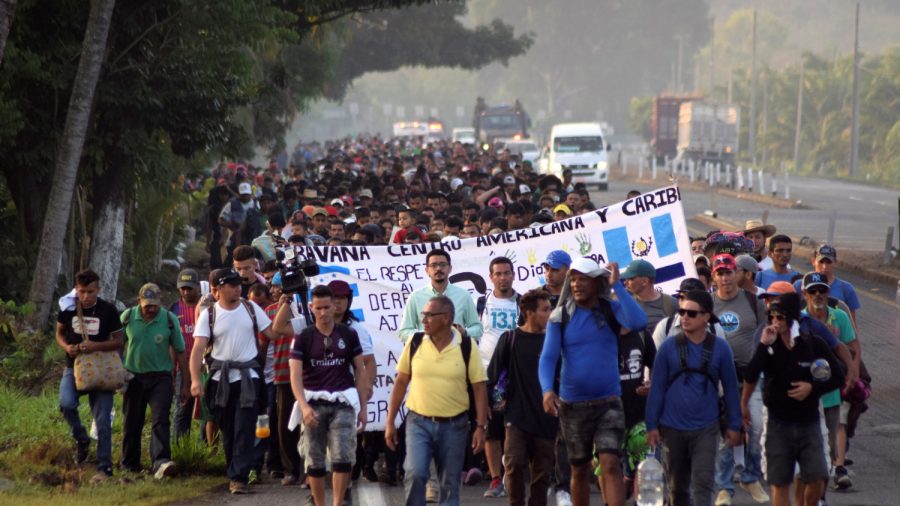SAN DIEGO—A new migrant caravan of 20,000 people is forming in Central America with plans to head towards the United States southern border, Mexico’s Interior Secretary Olga Sanchez Cordero said on March. 27, without elaborating further on when it will start its journey north, according to media reports.
Sanchez Cordero said the criminal organizations behind the “mother of all caravans” are involved in human trafficking, child exploitation, and even organ trafficking.
“You can imagine the size, the scope of this migration flow and that sometimes there’s human trafficking by organized crime,” she said.
Sanchez Cordero said criminal groups involved could be making billions from the huge groups of Central Americans traveling to the United States’ southwest border.
“Each migrant represents between two to six thousand dollars for them,” the interior secretary said on March 27 in an interview following the XXXII National Legal and Fiscal Consultation for Churches and Religious Associations conference, according to media reports.
Currently, a caravan of approximately 1,500 to 2,500 migrants from Central America and Cuba is traveling through Mexico to reach the U.S.-Mexico border. The group took off on March 23 and is expected to arrive at the southwest border in several weeks.
Alrededor de mil quinientas personas migrantes integran una de las dos caravanas que actualmente se desplazan por el estado de #Chiapas.@CNDH @M_OlgaSCordero @INAMI_mx @A_Encinas_R #Cuba #Honduras #Migrants #CaravanaMigrante #CrisisMigratoria @CIDH pic.twitter.com/FPsWFJuLyl
— Movimiento Migrante Mesoamericano (@MMMesoamericano) March 29, 2019
Sanchez Cordero’s announcement of a 20,000-member strong caravan comes a day after she met with Department of Homeland Security (DHS) Secretary Kirstjen Nielsen in Miami to discuss how the two countries can stem the massive flow of Central Americans that has overwhelmed U.S. border security.
Last month, Customs and Border Protection (CBP) apprehended more than 75,000 illegal migrants at the southwest border. This month, an estimated 100,000 illegal immigrants are expected to be detained. Border Patrol agents arrested 3,974 illegal aliens along the southwest border on March 19 alone.
“Our border crisis has gone from a national emergency to a near system-wide meltdown,” Nielsen wrote on Twitter on March 27.
Make no mistake—our border crisis has gone from a national emergency to a near system-wide meltdown. We must be able to secure our borders AND protect vulnerable populations fleeing persecution. But we can’t do this effectively without action to fix our laws.
— Sec. Kirstjen Nielsen (@SecNielsen) March 27, 2019
To relieve overcrowding at many facilities, Border Patrol agents have had to start releasing illegal immigrants immediately upon apprehending and processing them.
“For the first time in over a decade, CBP is performing direct releases of migrants,” Customs and Border Protection Commissioner Kevin McAleenan said on March 27. “This is in a limited capacity, it’s very reluctantly, and it represents a negative outcome for enforcement.”
He said the practice will only encourage even more migrants to cross the U.S. border illegally and claim asylum—regardless of the merit of their claim.
“But it is the only current option that we have from a life and safety perspective to try to reduce the overcrowding in our facilities,” McAleenan said.

Transnational criminal organizations know large numbers of migrants will be released into the country and are exploiting the immigration system, Nielsen said. “Our system is broken, it’s exploited & those who wish to harm us are profiting,” she wrote on Twitter on March 27.
The truth is that the vast majority of migrants who apply for asylum do not qualify for it. Smugglers & traffickers know this, and they’re taking advantage of a perceived “free ticket” into America. Our system is broken, it’s exploited & those who wish to harm us are profiting.
— Sec. Kirstjen Nielsen (@SecNielsen) March 27, 2019
Mexico and the U.S. said they are working together to identify criminal groups and individuals organizing and funding human trafficking behind the caravans, according to a press release by the Department of Homeland Security.
Sanchez Cordero said Mexico is investigating a bus line that goes from the country’s southern border with Guatemala in Tapachula, Chiapas to Mexico’s northern border. “This is unacceptable because migration is overflowing,” she said.
Although Mexico will not militarize the southern border; it will not continue to grant large numbers of humanitarian visas either; and will instead set up a “containment” belt of federal forces across the Isthmus of Tehuantepec, which is the narrowest part of the country’s south near the Guatemala border, according to reports. “It’s going to be a big change.”
The U.S. also signed an agreement on March 28 with Honduran President Juan Orlando Hernandez and security ministers representing Guatemala and El Salvador to “crackdown on criminal organizations and networks who are fueling and [sic] unprecedented regional crisis,” and to combat the formation of large groups and caravans at the source.
The Epoch Times reporter Charlotte Cuthbertson contributed to this report.


